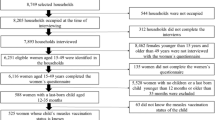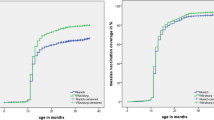Abstract
The reasons for the low level of acceptance of measles vaccine were investigated through interviews with the mothers at the time of their children enrollment in the first year of attendance at several nursery schools in Milan city and its suburbs. Data were also collected on the natural disease.
Only 192 (13.8%) of the 1386 children included in the study had already suffered natural measles and 45 of them before the age of 12 months. Of the total, 10% of the children had been vaccinated, more in the city of Milan than in the suburbs. Approximately one-half of the vaccinations had been administered by family doctors and the other half in Public Health facilities. Less than half of the vaccinations administered in the city of Milan proved to have been registered in Public Health Office records. The frequency of vaccinated children was significantly higher among mothers with higher levels of education than among those with lower levels of education.
The reasons for the lack of vaccination most. frequently given by the mothers of the 1247 unvaccinated children were ≪ ignorance about the vaccine ≫ (38% of the mothers) and the ≪ belief that measles is an innocuous disease ≫ (36%). These were followed by ≪ fear of post-vaccinal reactions ≫ and ≪ advice against measles vaccine ≫ given, in most cases, by family doctors. The frequency of responses for each one of these reasons was significantly different in Milan with respect to the suburbs. This difference was also evident in the comparisons between mothers with higher levels of education with respect to mothers with low levels of education.
Similar content being viewed by others
References
A.C.I.P. (1982): Measles Prevention. Morbidity and Mortality Weekly Report (U.S. Department of Health and Human Services), 31: 217–231.
Adjaye N.(1981):Measle immunization.Some factors affecting non-acceptance of vaccine. -Publ. Hlth (London), 95: 185–188.
Adjaye N., Azad A., Foster M., Marshall W.C., Dunn H. (1983): Measles serology in children with a history of measles in early life. - Brit. Med. Med. J., 286: 1478.
Assad F. (1983): Measles: Summary of Worldwide impact. - Rev. Infect. Dis., 5: 452–459.
Bussey A.L., Holmes B.S. (1977): Immunization levels — Need they all decline? Lancet, II: 970–971.
Campbell A.G.M. (1983): Measles immunization: why have we failed? Arch. Dis. Child, 58: 3–5.
Grandolfo M., Santoro R. (1985): Personal communication from Istituto Superiore della Sanità (Rome).
International Meeting on measles immunization. Milano, 10 February 1978. Proceedings published in: L'Igiene Moderna (1980), 78: 115–237.
Porro De' Somenzi C. (1979): Analisi dei costibenefici. Proceedings of Regional Conference on vaccination against measles. — Milano, 16 December 1978. — Ann. Sclavo, 21: 373–376.
Regional Conference on vaccination against Measles. Milano, 16 December 1978. Proceedings published in Ann. Sclavo (1979), 21: 371–412.
Author information
Authors and Affiliations
Additional information
Corresponding author.
Rights and permissions
About this article
Cite this article
Profeta, M.L., Ferrante, P. & De' Somenzi, C.P. A survey on factors affecting acceptance of measles vaccine. Eur J Epidemiol 2, 128–133 (1986). https://doi.org/10.1007/BF00157024
Issue Date:
DOI: https://doi.org/10.1007/BF00157024




